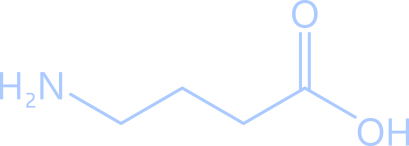
Symptoms and Disorders
Symptoms of a Serotonin Deficiency
The extreme importance of serotonin for the human body becomes very clear when one examines what a deficiency of this important hormone can trigger. A serotonin deficiency is very often responsible for sleep disorders, depression, listlessness, and fatigue or severe exhaustion. Even many intestinal problems are associated with a lack of serotonin. If the body releases too little serotonin, a snowball effect is put into motion, since other important messenger substances – like melatonin, the nighttime hormone which is formed from serotonin in the evening — also need serotonin for their production. In this way, a serotonin deficiency often also leads to a melatonin deficiency, and subsequently to sleep disorders.

Gamma-aminobutyric acid (GABA), one of the most important neurotransmitters in the brain, is also closely related to serotonin, as the “happiness hormone” is significantly involved in its production. Incidentally, GABA ensures relaxation, has an anxiety-relieving effect and, to some extent, induces sleep.
Beware of Serotonin Excess!
As serious as a serotonin deficiency can be, an excess of the hormone is equally dangerous. This condition, known as serotonin syndrome, usually results from the interaction of drugs that interfere with serotonin metabolism.
Special caution is advised if you take serotonin reuptake inhibitors (SSRIs), drugs often prescribed to treat depression, as these prolong the duration of action of serotonin on the nerve cells. If a supplement or medication containing one of the serotonin precursors, such as tryptophan and/or 5-HTP, is taken in conjunction with these SSRIs, under certain circumstances serious consequences may occur. Symptoms of serotonin excess can include:
- anxiety
- agitation
- increased muscle tension
- muscle twitching
- restlessness
- tremor
- confusion
Although the development of serotonin syndrome is extremely rare, if you experience any of these symptoms, you should consult a doctor immediately, as a prolonged excess of serotonin can become a life-threatening situation in the worst case.
Serotonin Deficiency in the
Central Nervous System
A deficit of serotonin in the brain can manifest itself in many ways and result in a variety of different clinical conditions, such as depression, other neuropsychiatric disorders, fibromyalgia and sleep disorders.
Depression
Mental illnesses are on the rise, in fact, the World Health Organization (WHO) estimates that depression will be among the second most common diseases by 2030. People suffering from depression almost always show dysfunction of their serotonin balance.
Mental illnesses are on the rise, in fact, the World Health Organization (WHO) estimates that depression will be among the second most common diseases by 2030. People suffering from depression almost always show dysfunction of their serotonin balance.
Typical symptoms of depression include a lack of energy, a feeling of hopelessness, negative (even suicidal) thoughts, sleep disturbances and daytime fatigue. Muscle pain, gastrointestinal complaints or headaches are the most common physical side effects.
The factors that contribute to depression are still not fully understood. One thing is certain, however: There is not just “one” cause of depressive moods. Rather, a wide variety of processes in the body are responsible. Recent studies show that an imbalance of various hormones and neurotransmitters, especially serotonin, is often responsible.
Seasonal Affective
Disorder (SAD)
In seasonal affective disorder (SAD), which occurs mainly in the fall and winter months, a serotonin deficiency can also be responsible for the symptoms, which include depressed mood, reduced energy levels, anxiety, increased appetite for carbohydrates and sweets and weight gain.
In seasonal affective disorder (SAD), which occurs mainly in the fall and winter months, a serotonin deficiency can also be responsible for the symptoms, which include depressed mood, reduced energy levels, anxiety, increased appetite for carbohydrates and sweets and weight gain.
The reason for the reduced serotonin release in cases of SAD: People suffering from winter depression show more activity of the serotonin transporters (SERT) when there is little sunlight. These transporters remove serotonin from the bloodstream or tissue fluid and trap it in the cells, resulting in a deficit of biologically active serotonin, with the aforementioned symptoms as a consequence.
Fibromyalgia
Fibromyalgia syndrome (FMS) is a complex disease characterized by muscle pain, fatigue, fever, insomnia, irritable bowel symptoms and swollen lymph nodes. Those affected often also experience depression, anxiety, cardiovascular disorders and impairment of their sense of balance and cognitive abilities.
Fibromyalgia syndrome (FMS) is a complex disease characterized by muscle pain, fatigue, fever, insomnia, irritable bowel symptoms and swollen lymph nodes. Those affected often also experience depression, anxiety, cardiovascular disorders and impairment of their sense of balance and cognitive abilities.
Approximately four percent of the population, mainly women, are affected by FMS. The causes of this syndrome have not been adequately researched, although numerous studies are underway to investigate the factors responsible. Among the limited findings, it is believed that the neurotransmitters in the brains of people suffering from FMS do not function as they do in healthy people. FMS patients have also been shown to have low levels of serotonin, particularly in the brain.
Scientists have also found that the gut and its microbiome influence pain perception. One reason could be that there are more serotonin receptors in the gut than in the brain, with nutrition playing an important role. For example, according to various studies, particular caution is required with fructose because of its ability to negatively influence tryptophan uptake, and thus serotonin production.
Sleep Disorders
How do you feel when you have trouble falling asleep for several nights in a row or wake up again and again during the night, and no amount of counting sheep will bring you the sleep you long for? Waking up the next morning is usually particularly difficult, as is concentrating during the day. Food cravings are not uncommon, and your mood is usually not a good one.
How do you feel when you have trouble falling asleep for several nights in a row or wake up again and again during the night, and no amount of counting sheep will bring you the sleep you long for? Waking up the next morning is usually particularly difficult, as is concentrating during the day. Food cravings are not uncommon, and your mood is usually not a good one.
Sleep deprivation over a longer period can also have more serious consequences because the risk of diabetes, obesity and cardiovascular diseases increases enormously. A combination of serotonin and melatonin deficiency may be responsible for all these symptoms and the long-term consequences because serotonin is converted into melatonin at night. As it is, these two hormones work together to ensure a healthy sleep-wake cycle.
Studies have also found that serotonin is important for sleep architecture as well as sleep quality and that it supports the transition from one sleep phase into the next. Another research result: Serotonin helps to achieve healthy sleep at the right time, particularly in the case of sleep disorders caused by stress or anxiety.
Factors That Disrupt Healthy Sleep
Many people often only realize the importance of healthy, adequate sleep only when it is lacking.
When it comes to getting a restful night’s sleep, the biggest disruptive factors are considered to be shift work, jet lag and light at night, for example, street lights or the glowing display of the alarm clock, TV or mobile phone, which negatively influence the important sleep-wake rhythm with the blue light they emit.
A heavy dinner can also lead to sleep disturbances because the entire system is then busy digesting the calorie bomb. As a result, the release of melatonin is disturbed, and with it the release of serotonin the following morning.
Although the development of serotonin syndrome is extremely rare, if you experience any of these symptoms, you should consult a doctor immediately, as a prolonged excess of serotonin can become a life-threatening situation in the worst case.
Other Neuropsychiatric Disorders
Apart from depression, disruption of serotonin levels is associated with a variety of other neuropsychiatric disorders, from panic attacks and anxiety disorders to schizophrenia and Alzheimer’s disease.
Anxiety Disorders/Panic Attacks
Low serotonin levels or altered metabolic processes in the brain can be found in people suffering from anxiety disorders and panic attacks. This is because chronic stress, emotional strain and certain life circumstances can all negatively influence serotonin synthesis and are thus considered as disruptive factors of maintaining healthy levels of serotonin.
Schizophrenia
In recent years, there has also been increasing evidence that inflammation, which occurs in schizophrenia, affects and causes an imbalance in tryptophan metabolism. This situation, in turn, negatively affects serotonin levels.
Alzheimer’s Disease
A link to a serotonin deficiency has long been established in Alzheimer’s disease. As studies have shown, it is not only melatonin levels that are significantly lower in Alzheimer’s patients than in healthy people, but tryptophan and serotonin levels in particular.
Serotonin Deficiency in the Periphery
Serotonin also plays an extremely important role in the peripheral organs, because the largest amount of this important messenger substance in the body — approximately 95 percent — is found here. A serotonin deficiency can therefore lead to serious, life-threatening diseases in the cardiovascular system, disorders of the immune system, cancer and metabolic disorders.
Cardiovascular
System
Serotonin plays a significant role in the healthy functioning of the cardiovascular system, for example in blood clotting. However, its influence on the blood vessels, on which it has a regulating effect by causing them to contract and relax, is also important. Thus, serotonin also influences blood pressure. Furthermore, serotonin protects against excessive adrenaline release, which on the one hand has an anxiety-relieving and aggression-inhibiting effect, but also benefits the regulation of blood pressure.
Atherosclerosis
Atherosclerosis is a major cause of myocardial infarction and stroke. The degradation of tryptophan, along with oxidative stress, plays an important role in the inflammatory processes that occur as a part of this process. Studies have also confirmed a link between coronary heart disease and tryptophan: Elevated levels of kynurenine — a degradation product of tryptophan — in the urine indicate a positive association for the occurrence of atherosclerosis.
Immune
System
Serotonin plays a key role in chronic inflammatory processes and is an important regulator of the body’s immune defense, for example in autoimmune diseases or age-related diseases caused by a weak immune system. In this context, serotonin has proven to be an effective antioxidant that protects cells from oxidative stress. Thanks to its antioxidant properties, it also inhibits the production of inflammatory cytokines, preventing the health damage they can cause. This is an important therapeutic approach to controlling inflammatory processes.
Cancer
Several scientific studies are now available on the involvement of serotonin in the development of cancer cells and the spread of metastases.
As such, previous study results show that serotonin levels in tumors play a crucial role in the progression of cancer − one reason why serotonin and its precursors are already used in the treatment of various types of cancer.
In colorectal cancer, for example, reduced tryptophan levels have been linked to tumor growth, as well as in familial adenomatous polyposis (FAP), a common hereditary form of colorectal cancer. Tryptophan may thus become an important biomarker in the identification of cancer.
The Role of Neurotransmitters in Cancer
As numerous studies have also shown, cancer cells use the signaling pathways that control neurotransmitters such as serotonin for their uncontrolled proliferation. These neurotransmitters can also positively influence immune cells in the tumor, which could indicate an effective approach to developing new cancer therapies.
Metabolism
You are probably familiar with this scenario: If you are happy and balanced, giving up a big piece of chocolate cake doesn’t bother you much.
However, it’s quite a different story when you’re annoyed, sad or under too much stress. In those moments, that giant carton of chocolate ice cream comes at just the right time, as does the piece of cake or the stash of sweets. If these types of cravings last for a longer period and you have trouble controlling your healthy eating behavior, a serotonin deficiency is probably partly responsible. In most cases, this also leads to unwanted weight gain.
Influence of Insulin
By the way, it should be noted that chocolate actually increases the release of serotonin…but only in the short term. The responsible mechanism: Eating a carbohydrate-rich meal stimulates the release of insulin, which in turn stimulates the synthesis of serotonin. That’s why you quickly feel completely satisfied after a piece of chocolate or a banana.
If you have ever followed a fasting cure of any duration, you may be familiar with the effect that after an initial habituation phase, you feel better than ever. So, it seems that longer breaks from eating also support serotonin activity. Even though the mechanisms are not yet fully known, this effect is likely to be related to a normalization of insulin release, because serotonin regulates sugar metabolism and thus has a significant influence on the release of insulin.
Latest News and Articles
Here, you will find valuable information and everything worth knowing about serotonin – as well as how to stay happy, mentally fit and healthy into old age, thanks to this important messenger substance.
Enjoy reading!
Serotonin and the Gut: Why Healthy Levels are Critical for Digestion
Serotonin is an important neurotransmitter that is most often recognized for its role in regulating…
The Little-Known Connection Between Serotonin and Emotional Eating
Emotional eating is a common phenomenon in which people turn to food for comfort during…
Serotonin and Oxidative Stress: Implications for Mental and Physical Health
Serotonin is often celebrated as a “feel-good” neurotransmitter, a reputation it has earned because of…



